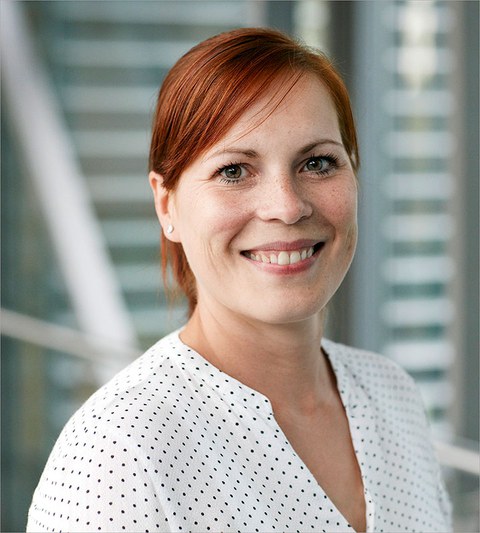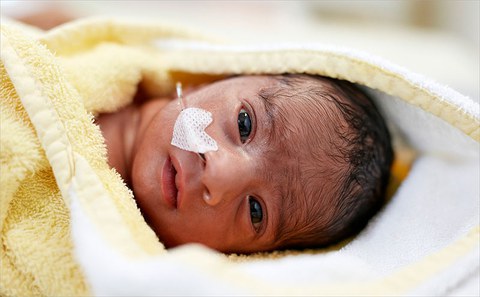Giving a voice to the youngest
(Interviewed in 2017)
Dagmar Möbius

Linguist Anne Müller-Schuchardt is in charge of communication for the Deutsche Stiftung Kranke Neugeborene (DSKN) – the German foundation for sick newborns. She also manages the foundation's work and assets.
She would surely have made a good doctor, too. But it was more than just university admission restrictions that set Anne Müller-Schuchardt on a different path. And her current job is a daily source of happiness to her, for it combines communication and medicine.
How do you talk to employees? Who should talk to whom about what? And when? These were questions that Anne Müller-Schuchardt faced from an early age. The daughter of an entrepreneur, she had a particular interest in communication. She also saw medicine as a useful and fulfilling career. "But I didn't meet the admission requirements," she admits. That is not the whole truth, however; originally from Osterode in the Harz region, she experienced more in her childhood than many of today's thirty-somethings. The family had to move for work reasons around every two years. In 1993, at the age of 14, she came to Dresden from Hesse. "That was a very important moment for me as a teenager," says the 38-year-old, looking back on her move to Saxony. She has since put down her roots here and considers herself a local.
"Something with language" instead of business management
That she would one day take over the family business, an automotive supplier, was in the back of her mind when she enrolled to study business management in Würzburg after high school. Three semesters later, she realized it just wasn’t her thing. Instead, she found her dream combination at TU Dresden. In October 2000, she began a Magister degree in applied linguistics with a major concentration in corporate communications along with law and Romance studies/literature. She worked for almost five years alongside her studies as a student assistant at the Chair of Applied Linguistics at the Faculty of Linguistics, Literature and Cultural Studies. She has particularly fond memories of Professor Axel Satzger and Dr. Regina Bergmann. "The department was small and the atmosphere very familiar. There were around 30 to 60 students, and 10 to 15 in the seminars." She now sees the fact that she failed the interim exam twice as an opportunity in disguise. "Professor Satzger gave me a proverbial kick in the behind; he saw my potential and encouraged me not to give up. I'm very grateful for that."
Industry and research
One highlight for Müller-Schuchardt was her four-month internship at the U.S. company VForge in Colorado. At the innovative precision metal casting company, which manufactures products for the consumer goods, medical, defense and automotive industries, she helped shape management and marketing processes and developed an orientation program for new employees, and also did some work in production. This was excellent preparation for her first job after university. As a management trainee at Druckguss Heidenau GmbH, she spent time in all departments from preparation and production to development, purchasing, quality assurance, and sales. She was also responsible for publishing the employee magazine "DGH-Group InForm," which she had developed as part of her final-year dissertation project. After a few months, research beckoned. Anne Müller-Schuchardt worked from 2011 to 2013 as a research assistant at the Public Health Sachsen research association at TU Dresden’s Faculty of Medicine. She was responsible for externally funded projects in the field of ultrafine particles and health, and was a reviewer for a number of academic journals.

One in ten babies are born prematurely and one in five receive hospital treatment. DSKN runs a wide range of projects to promote excellent long-term care.
The perfect job
After parental leave and the end of her temporary contract, Anne Müller-Schuchardt was recruited for her current role by Professor Mario Rüdiger. The Dresden pediatrician and neonatologist had founded the Deutsche Stiftung Kranke Neugeborene (the German foundation for sick newborns, DSKN) in 2014 to provide structured, long-term care for sick and premature newborns. Since January 2015, the English, Spanish and Italian-speaking communications expert has been the press and public relations officer at the Foundation in Dresden. "One in ten babies are born prematurely and one in five receive hospital treatment," she says. Providing information for parents is a major focus. The neoApp, a kind of digital diary developed two years ago, has been downloaded over 1000 times. Educational videos explain the importance of breast milk, what an intensive care unit is, why "kangaroo care" is good for babies and parents, and first aid measures that parents should be familiar with. Anne Müller-Schuchardt is currently working on a new project, for which she is collaborating with staff from her former department. "Breaking bad news" is a new training module that will teach physicians how to discuss difficult diagnoses or prognoses sensitively and empathetically with family members.
Her combination of subjects – communications/public relations and law – has proved perfect for the linguist's current job. "Our central goal is to raise awareness of the DSKN. My legal knowledge is of great help because there is a particularly strong legal spotlight on foundations." Anne Müller-Schuchardt has only one wish for the future, and that is never to move again.
Contact:
Anne Müller-Schuchardt, M.A.
Public Relations Officer
Deutsche Stiftung Kranke Neugeborene
Email
Website
